Fashion
Are Tennis Shoes Business Casual? Here’s What Fashion Experts Say
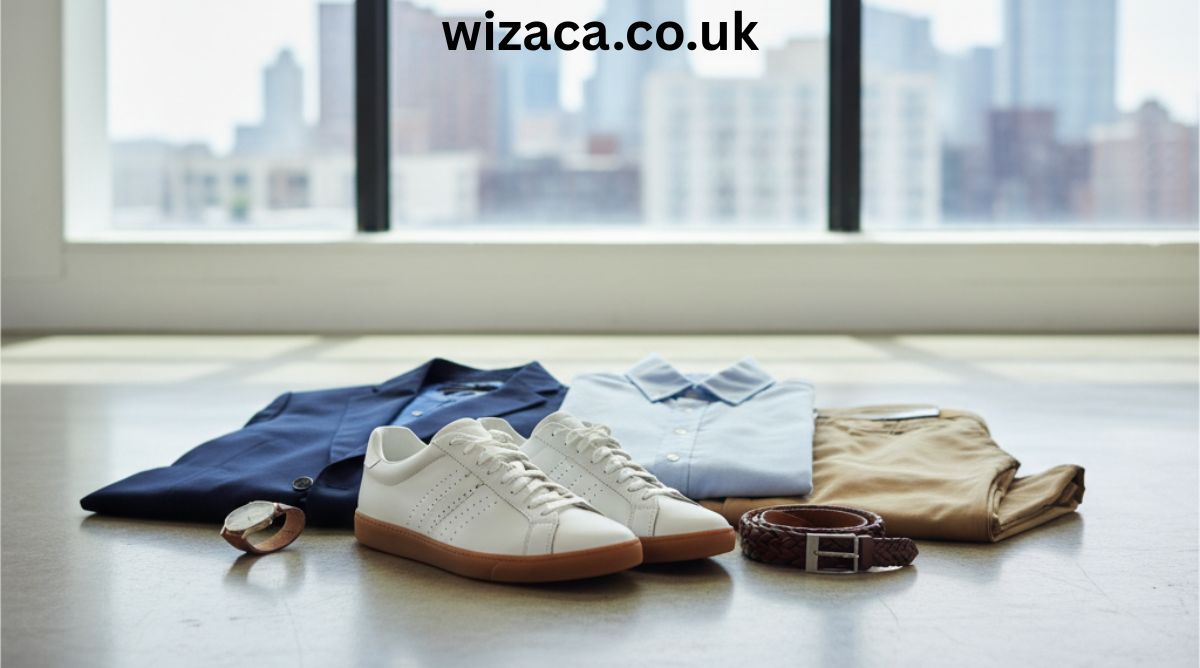
Introduction
Fashion and workplace attire have evolved significantly over the years. The rigid distinction between formal and casual styles is slowly blurring, thanks to modern workplaces adopting more flexible dress codes. A common question many professionals ask is: “Are tennis shoes business casual?”
The short answer is: It depends on your workplace and how you style them. While tennis shoes are traditionally seen as casual footwear, they can sometimes fit into the business casual category if chosen and styled appropriately.
In this guide, we will explore what business casual really means, whether tennis shoes qualify, workplace expectations, and tips to pull off this look with confidence.
What Does Business Casual Mean?
According to Wikipedia, business casual is a dress code that combines traditional business wear with a more relaxed style. It typically includes slacks, khakis, dress shirts, blouses, and sometimes blazers. The rules can vary depending on the industry, company culture, and location.
- Traditional business casual footwear includes loafers, oxfords, ballet flats, and low heels.
- Tennis shoes, being athletic footwear, traditionally fall under the casual category.
However, with fashion trends evolving, some modern workplaces are redefining what qualifies as acceptable.
Are Tennis Shoes Considered Business Casual?
The debate comes down to context. In strict business casual settings, tennis shoes are often not accepted, as they lean more toward casual or sporty wear. But in progressive workplaces—especially in tech companies, creative industries, or startups—tennis shoes can be styled into a business casual outfit.
When Tennis Shoes Work as Business Casual:
- If they are clean, minimalistic, and neutral-colored (white, black, gray, or navy).
- If they are made of premium materials like leather instead of canvas.
- If the workplace has a relaxed dress code where smart sneakers are acceptable.
When Tennis Shoes Are Not Business Casual:
- If they are brightly colored, flashy, or overly sporty.
- If they look worn out or dirty.
- If your workplace specifically prohibits sneakers.
How to Style Tennis Shoes for Business Casual
If your workplace allows some flexibility, tennis shoes can be styled to look professional while keeping comfort in mind.
1. With Dress Pants or Chinos
Pairing slim-fit chinos or tailored dress pants with white or black leather tennis shoes creates a sharp yet relaxed look.
2. With Blazers
Adding a blazer to your outfit elevates your style and balances the casual vibe of tennis shoes.
3. With Dresses and Skirts (for Women)
Women can style tennis shoes with midi skirts or structured dresses for a chic and comfortable business casual outfit.
4. Stick to Neutral Colors
Neutral-colored tennis shoes blend better with business attire than neon or patterned ones.
5. Focus on Quality
Opt for premium brands offering minimalistic sneakers designed for smart-casual wear.
Industry Differences in Acceptability
The definition of business casual varies across industries:
- Corporate (Finance, Law, Consulting): Tennis shoes are generally not acceptable. Stick to traditional dress shoes.
- Tech Industry: Sneakers and tennis shoes are widely accepted, as comfort is prioritized.
- Creative Fields (Marketing, Design, Media): Stylish sneakers are often embraced as part of personal expression.
- Education & Academia: Policies differ, but many educators opt for comfortable tennis shoes, provided they look neat.
Benefits of Wearing Tennis Shoes in Business Casual Settings
- Comfort: Tennis shoes are far more comfortable than dress shoes, especially for long workdays.
- Versatility: They can transition easily from office to casual outings.
- Modern Appeal: Wearing tennis shoes can give you a youthful, stylish edge.
- Health-Friendly: Supportive sneakers reduce strain on feet and posture compared to stiff dress shoes.
Potential Drawbacks of Wearing Tennis Shoes
- Unprofessional Perception: Some colleagues or managers may see sneakers as too casual.
- Policy Violations: If the company has strict rules, wearing tennis shoes could cause issues.
- Mismatch with Formal Settings: Business meetings with clients or executives may require more formal footwear.
Alternatives to Tennis Shoes in Business Casual
If your workplace doesn’t allow tennis shoes but you still want comfort, consider:
- Loafers
- Derby shoes
- Chelsea boots
- Minimalist leather sneakers (specifically designed for smart casual wear)
These provide a balance between style and professionalism.
Tips to Decide if Tennis Shoes Are Acceptable
- Check your company dress code policy before wearing tennis shoes.
- Observe your colleagues and managers—if they wear sneakers, you likely can too.
- Save sneakers for casual Fridays or less formal days.
- Keep a backup pair of dress shoes in your office, just in case.
Conclusion
So, are tennis shoes business casual?
The answer is sometimes. While traditional definitions of business casual exclude athletic footwear, modern workplaces are more flexible. Clean, neutral, and minimalistic tennis shoes can be styled to fit into business casual outfits—especially in creative and tech industries. However, in conservative or client-facing environments, they may not be suitable.
Ultimately, whether tennis shoes are business casual depends on your company’s culture, dress code policy, and how you style them. If in doubt, play it safe with more traditional footwear.
Fashion
Walking Casual Men’s Red Shoes in the 21911 Zip Code: Style, Comfort, and Everyday Practicality
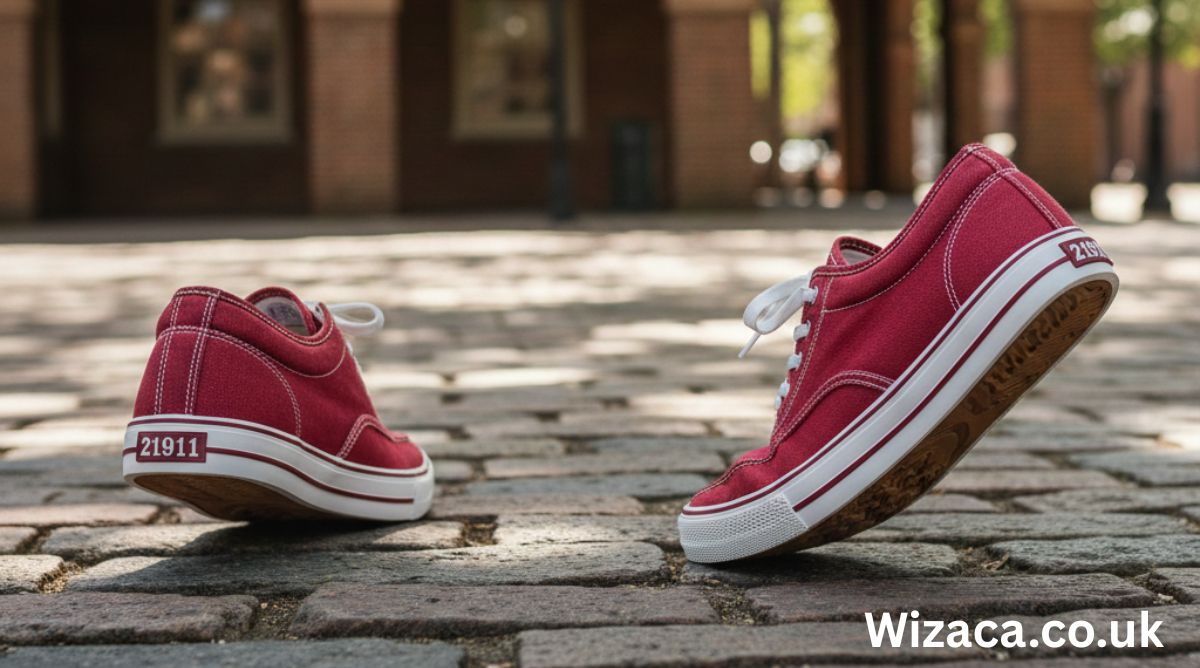
Walking casual men’s red shoes represent a growing fashion and comfort trend among men who want footwear that balances daily usability with bold personal expression. In the 21911 zip code area, which includes a mix of suburban neighborhoods, small commercial centers, and outdoor-friendly spaces, this footwear category has gained attention for its versatility and practicality. Red shoes, once considered unconventional for casual wear, are now widely accepted as a confident style choice that blends modern fashion with functional walking comfort.
This article explores walking casual men’s red shoes in depth, focusing on comfort, design, materials, use cases, seasonal suitability, and lifestyle relevance for people living in or shopping within the 21911 zip code region.
Understanding the Appeal of Red Casual Walking Shoes for Men
Red shoes stand out in a sea of neutral-colored footwear. For casual walking shoes, the color red represents energy, confidence, and individuality. Men choosing red casual shoes often want to express personality without sacrificing comfort.
In everyday walking scenarios such as errands, light outdoor activities, or social outings, red casual shoes provide visual interest while remaining practical. Their appeal lies in combining bold color with relaxed styling that does not feel formal or restrictive.
Lifestyle Characteristics of the 21911 Zip Code Area
The 21911 zip code area reflects a lifestyle that values comfort, practicality, and understated style. Residents often engage in daily walking, casual commuting, and weekend activities that require footwear capable of handling mixed environments.
Walking casual men’s red shoes suit this lifestyle because they work well on sidewalks, paved paths, light trails, and indoor environments. The blend of comfort and style fits naturally into the region’s daily rhythm.
Importance of Walking Comfort in Casual Footwear
Walking comfort is the defining feature of this shoe category. Unlike athletic running shoes designed for high-impact motion, walking casual shoes focus on steady support, cushioning, and natural movement.
Key comfort considerations include:
- Proper arch support for extended walking
- Cushioned midsoles to absorb impact
- Flexible soles that allow natural foot motion
- Breathable construction to prevent overheating
Red casual walking shoes that prioritize these elements provide all-day comfort without appearing overly sporty.
Design Elements of Men’s Red Walking Casual Shoes
Design plays a crucial role in how red walking shoes are perceived and worn. Successful designs balance color intensity with subtle styling to ensure versatility.
Common design characteristics include:
- Muted or deep red tones for versatility
- Minimal branding to maintain a clean look
- Low-profile silhouettes suitable for casual outfits
- Rounded toe shapes for comfort
These design choices help red shoes blend into everyday wardrobes without overpowering outfits.
Material Choices and Their Impact on Comfort
Material selection directly affects comfort, durability, and appearance.
Upper Materials
Common upper materials include:
- Soft synthetic leather for structure and easy maintenance
- Mesh panels for breathability
- Textile blends for lightweight flexibility
Each material influences how the shoe feels during extended walking sessions.
Sole Materials
The sole typically combines rubber and foam to balance grip and cushioning. Rubber outsoles improve traction on varied surfaces, while foam midsoles enhance comfort.
Breathability and Climate Considerations
In regions like the 21911 zip code area, seasonal temperature changes require shoes that adapt well throughout the year. Breathable materials help regulate foot temperature, especially during warmer months.
Walking casual red shoes with ventilation panels or moisture-wicking linings reduce discomfort during extended use and maintain freshness.
Casual Styling Versatility
One of the strengths of red casual walking shoes is their ability to complement multiple outfit styles.
They pair well with:
- Jeans and casual trousers
- Neutral-colored shorts
- Relaxed-fit chinos
- Casual jackets and hoodies
Red shoes often act as the focal point of an outfit, allowing the rest of the clothing to remain simple and balanced.
Red as a Statement Color in Men’s Footwear
Red has evolved from a niche fashion choice into a mainstream accent color in men’s footwear. It communicates confidence and individuality without appearing overly flashy when used thoughtfully.
In casual walking shoes, red is often softened through matte finishes, textured materials, or darker shades, making it more wearable for daily use.
Durability for Daily Walking
Walking casual shoes must withstand repeated use on various surfaces. Durability depends on stitching quality, sole construction, and material resilience.
Shoes designed for everyday walking typically feature reinforced stress points, durable outsoles, and flexible materials that resist cracking or deformation.
Fit and Sizing Considerations
Proper fit is essential for walking comfort. Casual walking shoes should allow enough room in the toe box while maintaining a secure heel fit.
Men in the 21911 zip code area often prefer shoes that accommodate walking on uneven sidewalks, parking lots, and indoor flooring, making a stable and supportive fit essential.
Support Features for Long Walks
Support features enhance comfort during longer walking sessions.
These features may include:
- Cushioned insoles for pressure distribution
- Firm heel counters for stability
- Arch support tailored to casual walking needs
Such features help reduce foot fatigue and discomfort.
Maintenance and Care of Red Casual Shoes
Red shoes require slightly more attention than neutral colors to maintain their appearance.
Basic care practices include:
- Regular cleaning to prevent dust buildup
- Spot cleaning stains promptly
- Allowing shoes to air-dry naturally
- Storing in a cool, dry place
Proper care extends the lifespan and appearance of walking casual shoes.
Seasonal Use and Adaptability
Walking casual men’s red shoes are suitable for multiple seasons with the right construction.
Spring and Summer Use
Lightweight materials and breathable designs work best during warmer months.
Fall and Mild Winter Use
Slightly thicker uppers and durable soles provide comfort during cooler weather, especially when paired with appropriate socks.
Social and Cultural Acceptance of Red Shoes
Red casual shoes have become socially acceptable in everyday settings. In community-focused areas like those within the 21911 zip code, personal style expression is often welcomed as long as it remains practical and tasteful.
This acceptance has encouraged more men to experiment with color while maintaining comfort.
Benefits of Choosing Red Over Neutral Colors
While neutral shoes blend in, red shoes stand out in positive ways.
Benefits include:
- Enhanced outfit personality
- Easier shoe identification
- Greater fashion confidence
- Unique yet approachable appearance
Red shoes strike a balance between boldness and everyday usability.
Walking Shoe Weight and Its Importance
Lightweight construction improves walking comfort by reducing strain on the legs and feet. Casual walking shoes are designed to feel light without sacrificing support.
Red casual shoes with lightweight materials are particularly suitable for extended daily use.
Foot Health and Ergonomic Design
Good walking shoes support foot health by promoting proper alignment and reducing pressure points.
Ergonomic design elements include:
- Contoured footbeds
- Shock-absorbing soles
- Natural flex grooves
These features contribute to long-term comfort and reduced foot fatigue.
Everyday Use Scenarios in the 21911 Area
Walking casual men’s red shoes fit naturally into daily routines such as:
- Neighborhood walks
- Casual work environments
- Shopping trips
- Social gatherings
- Light outdoor activities
Their versatility makes them a practical footwear choice for local lifestyles.
Style Confidence and Personal Expression
Wearing red shoes often boosts confidence. Men who choose bold footwear tend to feel more expressive and self-assured.
This psychological benefit enhances the overall walking and lifestyle experience.
Balancing Fashion and Function
The success of walking casual red shoes lies in their balance between fashion and function. They offer enough visual interest to feel stylish while delivering the comfort required for daily walking.
This balance is especially valuable for men who want a single pair of shoes that meets multiple needs.
Long-Term Value of Quality Walking Shoes
Investing in well-designed walking casual shoes provides long-term value through comfort, durability, and versatility.
High-quality red casual shoes maintain their shape, color, and comfort over time, making them a reliable wardrobe staple.
Common Misconceptions About Red Casual Shoes
Some men believe red shoes are difficult to style or impractical for everyday wear. In reality, modern designs are versatile and easy to incorporate into casual outfits.
When paired thoughtfully, red walking shoes feel natural rather than attention-seeking.
Trends in Men’s Casual Walking Footwear
Current trends favor:
- Bold accent colors
- Minimalist designs
- Comfort-focused construction
- Multi-purpose functionality
Red casual walking shoes align well with these trends.
Choosing the Right Pair for Your Needs
Selecting the right pair involves considering walking habits, personal style, and comfort preferences.
Key factors include:
- Walking frequency
- Preferred fit
- Climate conditions
- Outfit compatibility
Thoughtful selection ensures satisfaction and long-term use.
Conclusion
Walking casual men’s red shoes offer a unique combination of comfort, style, and practicality, making them an excellent choice for everyday use in the 21911 zip code area. Their ability to support daily walking while adding personality to casual outfits sets them apart from traditional footwear options.
By prioritizing comfort, durability, and thoughtful design, these shoes meet the demands of modern lifestyles. Red, as a color choice, reflects confidence and individuality without sacrificing versatility. For men seeking footwear that supports both movement and self-expression, walking casual red shoes represent a balanced and forward-thinking option.
Business
Are Black Jeans Business Casual
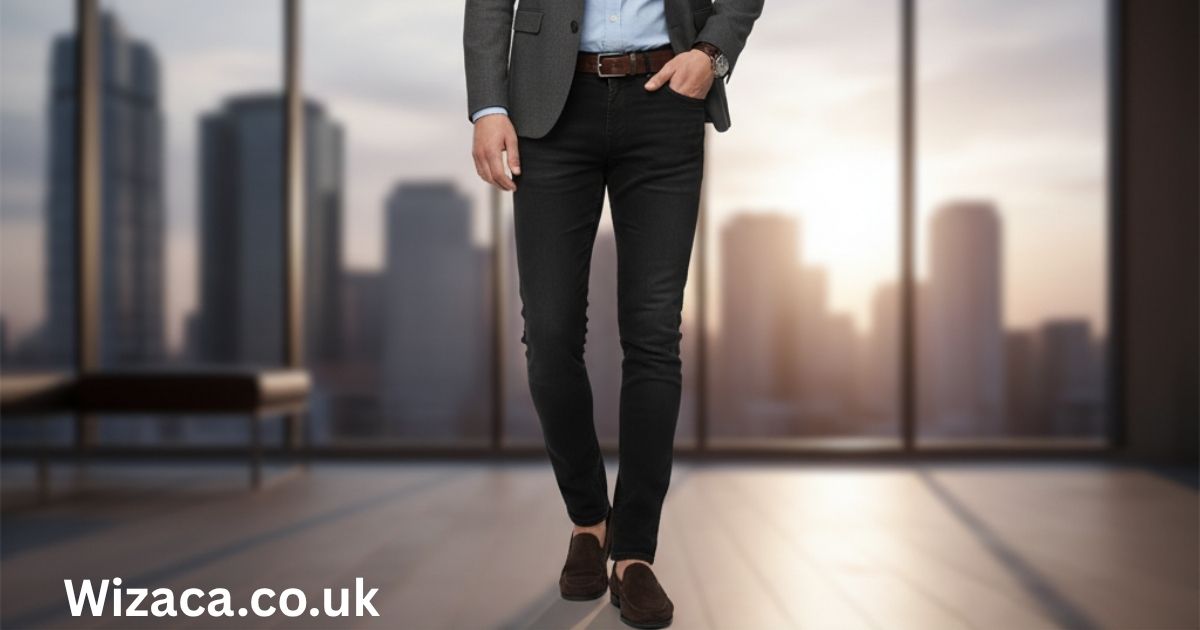
Introduction
The concept of business casual has evolved significantly over the past few decades. Once rigid and strictly defined by slacks, button-down shirts, and formal shoes, today’s workplaces often embrace more flexibility. A recurring question that many employees and professionals ask is: Are black jeans business casual?
The answer is not entirely straightforward because it depends on the workplace environment, the company’s dress code, and how the jeans are styled. In this article, we’ll dive deep into the definition of business casual, analyze the role of black jeans, and provide practical tips to make them work-appropriate.
What Does Business Casual Mean?
The term business casual refers to a dress code that blends traditional business wear with more relaxed clothing. It offers comfort while maintaining a professional appearance. Unlike formal wear, which typically includes a suit and tie, business casual gives employees flexibility in their wardrobe choices.
Common business casual items include:
- Collared shirts or blouses
- Dress pants or khakis
- Sweaters and blazers
- Closed-toe shoes like loafers or heels
However, jeans—especially blue or distressed ones—have always been controversial in the business casual debate.
Why Black Jeans Are Different
Black jeans occupy a unique space in the fashion world. While traditional denim is considered casual, black jeans often look more polished and closer to dress pants in appearance. Factors that make them more business-friendly include:
- Color Neutrality – Black is a versatile and professional color.
- Slim Fit Options – Many black jeans come in tailored or slim fits, resembling trousers.
- Fabric Finish – Dark washes and minimal distressing make them look cleaner.
This combination allows black jeans to pass as business casual in many workplaces when styled correctly.
Workplace Culture and Dress Codes

Whether black jeans are acceptable depends heavily on the company culture.
- Corporate Offices: Traditional firms such as law, banking, or finance often prefer formal attire, making jeans less acceptable.
- Creative Industries: Fields like tech, marketing, and design are more relaxed, where black jeans can easily fit into the dress code.
- Small Businesses or Startups: These often have the most flexible policies, with jeans becoming a norm.
Ultimately, checking the employee handbook or observing what colleagues wear is the best way to gauge if black jeans qualify as business casual in your workplace.
Styling Black Jeans for a Business Casual Look
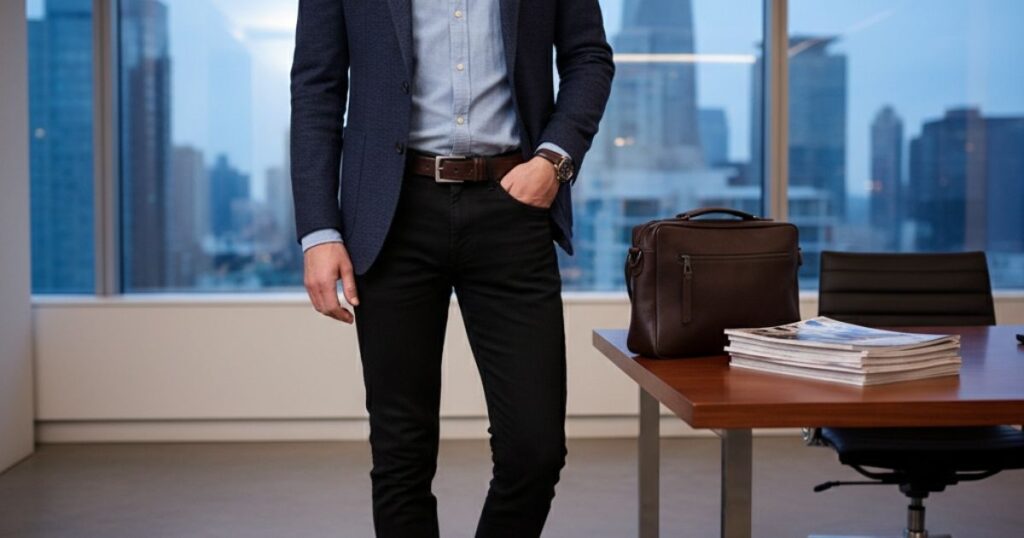
The key to making black jeans appear business casual lies in how you style them.
For Men:
- Pair slim-fit black jeans with a crisp button-down shirt.
- Add a blazer for extra professionalism.
- Choose polished shoes like loafers or brogues.
- Avoid sneakers unless the workplace is very casual.
For Women:
- Combine black jeans with a blouse or formal top.
- Layer with a blazer or cardigan.
- Wear closed-toe flats or heels.
- Avoid ripped or distressed styles.
When Black Jeans Are Not Business Casual
While black jeans can work, there are scenarios where they are not appropriate:
- Distressed or ripped black jeans – Holes or frays automatically look casual.
- Baggy styles – Loose fits appear unprofessional.
- Faded or washed-out black jeans – These lack the polished appearance of dark denim.
- Casual accessories – Wearing them with graphic T-shirts or sneakers makes them too casual.
Maintaining a clean, tailored, and minimal look is essential.
Black Jeans vs. Dress Pants
To better understand whether black jeans are business casual, let’s compare them to traditional trousers:
| Feature | Black Jeans (Tailored) | Dress Pants |
|---|---|---|
| Formality | Semi-formal | Formal |
| Comfort | High | Moderate |
| Versatility | High (work & casual) | Moderate |
| Professional Look | Acceptable (if styled) | Always Yes |
While dress pants will always be the safer option, black jeans provide a balance of comfort and professionalism when styled correctly.
Business Casual Across Different Countries

Interestingly, the interpretation of business casual varies globally:
- United States – Black jeans are often acceptable in tech and creative industries.
- United Kingdom – Jeans are less common in formal offices but can be worn in startups.
- Japan – Business attire is more formal, and jeans (even black) are rarely accepted.
- Europe (general) – Many countries embrace a smart-casual approach, making black jeans a practical option.
This shows that cultural expectations also influence whether black jeans fit the business casual standard.
The Role of Footwear with Black Jeans
Shoes can make or break your black jeans look in a business casual environment.
- Acceptable Footwear: Oxfords, loafers, Chelsea boots, ballet flats, block heels.
- Not Recommended: Athletic sneakers, flip-flops, or overly casual sandals.
Matching black jeans with polished footwear elevates the entire outfit, making it more office-appropriate.
Advantages of Wearing Black Jeans as Business Casual

- Comfort and Flexibility – Jeans are more comfortable than slacks.
- Cost-Effective – One pair of black jeans can be used for work and casual outings.
- Easy to Style – Black pairs well with most colors and accessories.
- Durability – Denim is often more durable than dress pants.
These advantages make black jeans a popular choice for employees in less formal industries.
Expert Opinions on Black Jeans in Business Casual
Fashion experts often recommend black jeans for business casual with the right styling. Many argue that black denim bridges the gap between casual and formal, especially when companies encourage smart casual or flexible dress codes.
For example, in workplace fashion guides, black jeans are often suggested as a substitute for trousers on less formal days. However, they stress avoiding ripped or overly casual styles.
Conclusion
So, are black jeans business casual? The answer is yes—if styled appropriately and permitted by your workplace dress code. Black jeans, when paired with professional tops, blazers, and formal shoes, can blend seamlessly into business casual attire. However, in traditional or conservative industries, sticking to slacks or trousers may be the safer choice.
Ultimately, black jeans provide the perfect balance between comfort and professionalism, making them an increasingly popular option for modern workplaces.
-

 Technology2 weeks ago
Technology2 weeks agoHow to Use CPT Upgrade in gem5: Complete Step-by-Step Guide
-

 Home Improvement2 weeks ago
Home Improvement2 weeks agoHow to Switch Out HZ311 Thermostat for Ecobee Premium Thermostat
-

 Gaming2 weeks ago
Gaming2 weeks agoHow to Sign Up on ETSGamevent
-

 Technology2 weeks ago
Technology2 weeks agoHow to Tell a Bad Plate on Flex Printing
-

 Technology2 weeks ago
Technology2 weeks agoHow to Update AMD Software Adrenalin Edition G14
-
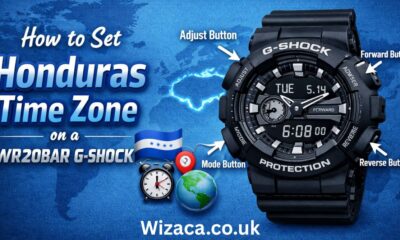
 Technology6 hours ago
Technology6 hours agoHow to Set Honuras Time Zone on a WR20BAR G-Shock
